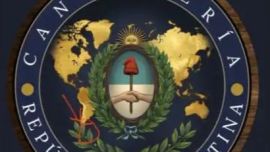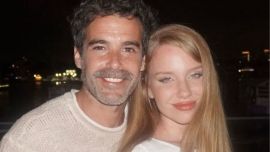Jorge Todesca took up reigns of the reigns of INDEC with the arrival of Mauricio Macri's Cambiemos administration to power in 2015.
As the director of the national statistics bureau, he had the responsibility of recuperating the credibility of national data after the intervention into the office's work by the Cristina Fernández de Kirchner administration in 2008.
Todesca has already presented his resignation, dated December 9, and will meet with his successor, Marco Lavagna, this week to organise the transition.
“It was a good choice," said the outgoing chief of Alberto Fernández's decision to select the economist to lead the bureau. "We [Todesca and Lavagna] share criticism of the intervention [by the previous government].”
The outgoing chief spoke with Perfil, ahead of his last week in the post.
How is the INDEC you are leaving for Lavagna different than the one you received?
INDEC had a visible destruction, which were the numbers that stopped being published. Job posts were lost and we stopped working with the international community.
Once we took control [in 2015] some were inspired and came back [to work with us]. We started working once again with the international community because, let’s remember, there was a motion of censure by the IMF because of the data on inflation and GDP, which increased in 2016.
We then started working with the OECD, which has a great intellectual potential in statistics.
There was a new statistics law presented last week. Does this look to protect INDEC?
The independence of INDEC was a very strong compromise from Mauricio [Macri]. I had two main tasks: one was the auditing, and the other was elaborating a project for the 'independisation' of the bureau. It was approved by the government and by the OECD, who also revised and approved it.
We’d need a new law to appeal to other sources, such as AFIP [tax-collecting agency], the registration of people. The demand for information is impossible to cover by walking the Gendarmeríe [Border Guards] across the country. Some countries are already not carrying out population censuses.
In that case we’d need to guarantee the preservation of the statistical secrecy…
INDEC is tied to the statistical secrecy, just as AFIP is tied to fiscal secrecy. We have confidential information about people and businesses all the time, but there are encryption processes to guarantee anonymity. If there are more bodies [involved], we’d have to continue to preserve it.
After the PASO [primary elections], Alberto Fernández said he wanted you to continue on in the role and you said no. Would you still be willing to collaborate if asked?
Yes, they are different moments. I was very careful in referring to the president of the Republic because he guaranteed this process of independence. I wasn’t very involved in the campaign but I do think that both teams need to have a shared fundamental empathy.
The institute is in this position of receiving new directions and the chosen person is right for the job.
Your daughter, Cecilia Todesca, is one of Fernández's main economic advisors. What expectations do you have about her role in the new administration?
If the majority of the people voted for Fernández I hope that most of the people who voted for him – and those who didn’t – are also satisfied. I don’t think he wants to have a bad term [in office]. There are different criteria, but the goal is the same.
With my wife, we’ve always given our children a very plural atmosphere with our family, and we have never told our children what to do. Cecilia was seduced by the same career, but more because of a shared enthusiasm. She’s a very capable girl, very reasonable. I like that she’s so involved in public service. I
don’t know what role she’ll have but she’s qualified. She graduated from our public university [Universidad de Buenos Aires] and has a masters from Columbia University.
Do you exchange ideas? Opinions?
It’s a new situation. We try to welcome everyone at our family meet-ups. We don’t discuss Alberto Fernández’s economic policy, rather about how she feels about the challenge, the difficulties that she sees and those I see.
When you look at Macri’s administration, what was missing and what stood out?
I am convinced that Argentina needs to have a strong relationship with the world. Defining the make-up of that link is another question.
But what probably increasingly generated the crisis was not accurately sizing up the fracture that already existed between the Argentine economy and society, and assuming that there was more time.
What the crisis generated was taking in more debt in foreign currency than we generate as surpluses in foreign currency. There was a great focus on the institutions, on eliminating the bureaucracy. These are important, but we can’t eat from them.
Did you misread the feeling on the streets?
Cambiemos is a new party. We had conversations about multidimensional poverty. Poverty has multiple dimensions, but in the immediate, in the daily, monetary poverty is decisive. That’s why I refused to run averages of multidimensional poverty, even though INDEC measures access to water and sewage systems.
High inflation is intolerable. We didn’t measure the transmission of inflation, which in Argentina is very high. There were a lot of public works completed in sanitation and it was thought that this would compensate for the transmission of inflation. I come from Peronism and I think that people need to have a physical connection to the government. It is the territorial work that has often been demonised.
But in a new party, born in the capital, there isn’t an extension for the entire country. If we imagine models of political make-up that correspond to a different society, at some point there is a rapture.
[At the end of October, INDEC will conduct the National Population Census, a huge survey that must be conducted every 10 years that has been prepared this time around by Todesca’s team.]
Is the Census ready?
We’re going to have a census in transition - classic, and on paper, because we don’t believe it’s ready to make the jump . The census has to be called for by the president and a council that revises INDEC's proposal. Because it was an election year, the meeting was not held. But we did run two pilots. It will be a one-day census. We also tested the questionnaire to see the amount of questions. Each questions costs around US$1 million to US$2 million.


















Comments